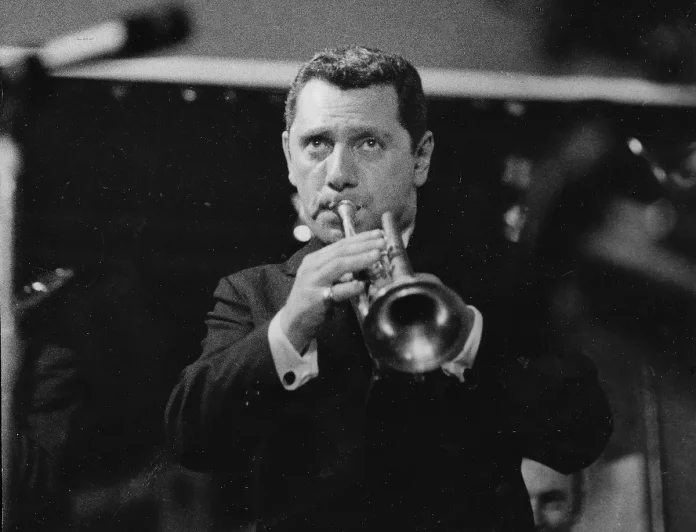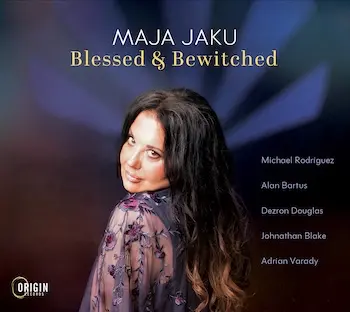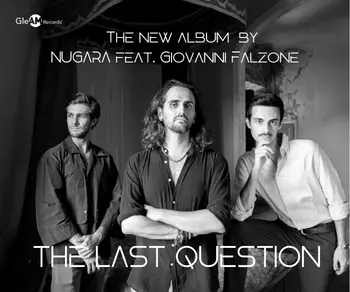This is one of a series of taped interviews with musicians who are asked to give a snap opinion on a set of records played to them. Although no previous information is given as to what they are going to hear, they are, during the actual playing, handed the appropriate record sleeve. Thus in no way is their judgement influenced by being unaware of what they are hearing. As far as possible the records played to them are currently available items procurable from any record shop.
Ruby is perhaps best known for his various recordings with Pee Wee Russell, Bud Freeman and George Wein, the latter having a great deal to do with bringing this fine cornetist more into the public eye. Ruby says that his finest music was made with Joe Sullivan and George Wettling, and that despite the fights which took place almost nightly (Ruby sat in the audience, for a ring side view), the music produced by this trio was really something. Unfortunately it was never recorded. A man of deep feelings and a very warm personality, Braff is also a person with very strong views on music and musicians. Never one to do things by halves, Ruby is now studying music with a classical pianist. – Sinclair Traill
All My Loving. Duke Ellington ’65. Reprise R 6154
I would rather Duke had selected some other tune than that – something perhaps written by Duke himself. Actually it came off quite well, but only because of Duke’s voicings, and not because of the tune. Anything he does has such charm. Mind you there is a little something in that tune, as with most of the stuff I have heard by Lennon – not important, but a little different. Anyway, I am always interested to see and hear what Duke does to anyone else’s material.
The Big Walk. Count Basie – Big Band Scene ’65. Columbia 33SX 173s
It’s good to hear that ‘old time’ master. The band are a beautifully moving machine – well oiled and they swing along easily and nicely. I can never hear enough of Count Basie playing the piano, I just love the way he plays. It would be wonderful if every pianist you ever played with played like that behind you. He’s the master of that kind of playing – it’s the time and the spacing. And the most important thing is that Basie knows just what to leave out, and where. No unnecessary things, he only plays those things which are a help to the rest of the band. It’s a big responsibility to be a piano player, because you have to know such a lot of things, and keep your eyes on so many things. How I wish I could make a record just with Basie behind me – just Basie and no one else.
‘Bruce Turner is a very rare thing, because he plays so good, and this sound is right and he is so musical. His phrasing also is perfect, and I just like everything about his playing – he’s a sensation’
Oh, Baby. Kenny Baker. Jazz Today – After Hours. Polygon JTL 4
Now I can see why so many people have spoken to me about Kenny Baker – he’s a real wonderful trumpet player. Very professional, sounds marvellous. As for Bruce Turner, well I just love him. I think that he is the best alto player anywhere in the world today – he is certainly the most interesting one, to me. I honestly don’t know anyone who plays better alto than he does – he’s quite marvellous. Dill Jones was nice there – he’s a good piano player, I often hear him in New York. But Bruce Turner is a very rare thing, because he plays so good, and this sound is right and he is so musical. His phrasing also is perfect, and I just like everything about his playing – he’s a sensation.
It Ain’t Necessarily So. Rex Stewart. Porgy & Bess Revisited. Warner W 1260
I can’t think why I have never heard that before. The writing by Jim Timmens is very good and Rex of course is a most individual player. There are only two trumpet players who do this kind of conversational playing – Cootie and Rex – do it well, I mean. This type of playing has to be a part of you, a natural thing. That was a wonderful chorus Rex opened with there – a definite feeling for the song he was playing. It is particularly nice being able to listen to a record such as this – I don’t get too many chances back in the States, and I think one should try and listen to all kinds of good music like that. No need to copy ever, but something is likely to rub off. Listen to all the styles and what you hear will surely enrich your own playing. I like to think my playing is influenced by all the good players. But we are all little branches off the Armstrong tree, let’s face it.
‘No jazz instrumentalists can compete with even the lowest symphonic player … in jazz every instrumentalist is a plumber compared with those guys’
Lonely Melody. The Bix Beiderbecke Legend. RCA Victor RD 27225
Boy, that guy Bix was really something. That was really beautiful – lovely tune too, why does no one play it these days? Too bad Bix didn’t live so that he could keep playing and writing, and playing the piano, the way he did. But he did get to do enough so that people could realise just how wonderful he was, and what he could do. He was a marvellous cornetist, but more wonderful than his cornet playing was his musical mind. After all, how interested is anyone in how well one plays one’s cornet, or any jazz instrument for that matter? But what you are interested in surely is the player’s wit, knowledge and imagination. If you want to listen to instrumental work, then you go to the classical players, for no jazz instrumentalists can compete with even the lowest symphonic player, as far as playing an instrument well is concerned. They practise for hours a day under the best teachers of discipline. In jazz every instrumentalist is a plumber compared with those guys. But Bix was more than just a marvellous instrumentalist.
Rockin’ Chair. Louis Armstrong. Best of Dixieland. RCA Victor RD 7713
How extraordinary Pops is! The only one who ever was that kind of a virtuoso, and yet at the same time a fantastic musician. In other words his great virtuosity never interfered at all with his jazz – he had just the perfect combination of everything. He had and still has everything. I spent three days this year listening to him play at Freedom Lane. Two shows a day in the open air, for three days, and I hung out and never missed a note. So stupid, none of those smart musicians in New York were there – just me with Johnny Windhurst and Jack Bradley the photographer, and Edmond Hall, who dropped in one night. He played so great, so fantastic – and none of those smart critics, who only live such a short distance away, bothered to come and hear him. What those . . . missed! One night he took about six encores of Hello Dolly – each one was different, each one was a masterpiece. The master of music, of all time.
‘Miles is a very artistic soul, with a lot of humour hidden under that cold front. He has so much feeling in him, I only wish that he would play more standard material, for I think that more nice things would come forth’
My Funny Valentine. Miles Davis. CBS BPG 62510
Miles is a very artistic soul, with a lot of humour hidden under that cold front. He has so much feeling in him, I only wish that he would play more standard material, for I think that more nice things would come forth from him if he played more real, good standard tunes. I am sure any guy gives himself a better break playing better meat. Miles has a voice of his own, and has borrowed little from anybody.
I have always felt that Miles would have loved to have come up against Frankie Newton – I am sure he would have really loved him, because Frankie was so subtle and different, but always with that good ‘meat and potatoes’ under him. I think Miles would have become very much influenced by him and it would have given Miles a lot of other things to fool around with, which he hasn’t got now. You see, I am sure Miles appreciates individual voices and styles, and I am sure he would have loved Frankie Newton. What a pity Frankie didn’t go on long enough. And you can say the same thing about Lips Page, who, next to Louis, I think was the most exciting trumpet player of them all.
Pity more of these young musicians don’t trouble to listen to the masters these days – they just don’t want to go out and find what is worth hearing, they’re not curious enough, which to me is silly. When you go to college, you are taught classical music, and the whole background of it. The history of music as well as the theory. But in jazz a lot of these guys never hear anybody, never listen to anyone – they have no background, they are just totally ignorant of the music they are playing, and that is why they sound like lunatics. No rhyme or reason in what they play – if you’ve no concept, then you have nothing to say, and you can’t get a concept by only listening to say four other musicians, all of whom play like you do!
On the other hand if you have talent and have taken the trouble to listen long enough, then you cultivate a good taste, and will have many nice things to say. Many people with talent play lousy because they never listen to the right things, so their talent is wasted. Without having heard Louis, certainly no one can play well enough to satisfy me. But you know, on the other hand it is sometimes impossible to play after having heard him – he plays so much he dries you up. Every day in his playing you will hear new things – if you listen to a record of his every day for ten years, you will still hear something new at the end of it – there never was a talent like that!
Imagine how lucky we are to live in an age when one can actually see and listen to this master of music. You can hear him and you can go up to him and talk to him, say ‘Hello, Pops.’ But you probably couldn’t have done that to Beethoven, you’d have had to go through some Prince or something – would never have been able to even get into the room where he kept his snuff boxes. But today we can talk to Louis, ask him questions – and I think that is very lucky. I never could understand those people who call him a clown. They say he doesn’t play any longer, he’s just a clown. They’re all lunatics! If laughing in rhythm, with every note on the beat, singing and talking in metre, as do all the best opera singers, is being a clown then Pops is a clown. Everything that man does has a beat, laughing, talking, walking, living – a real master of music.




